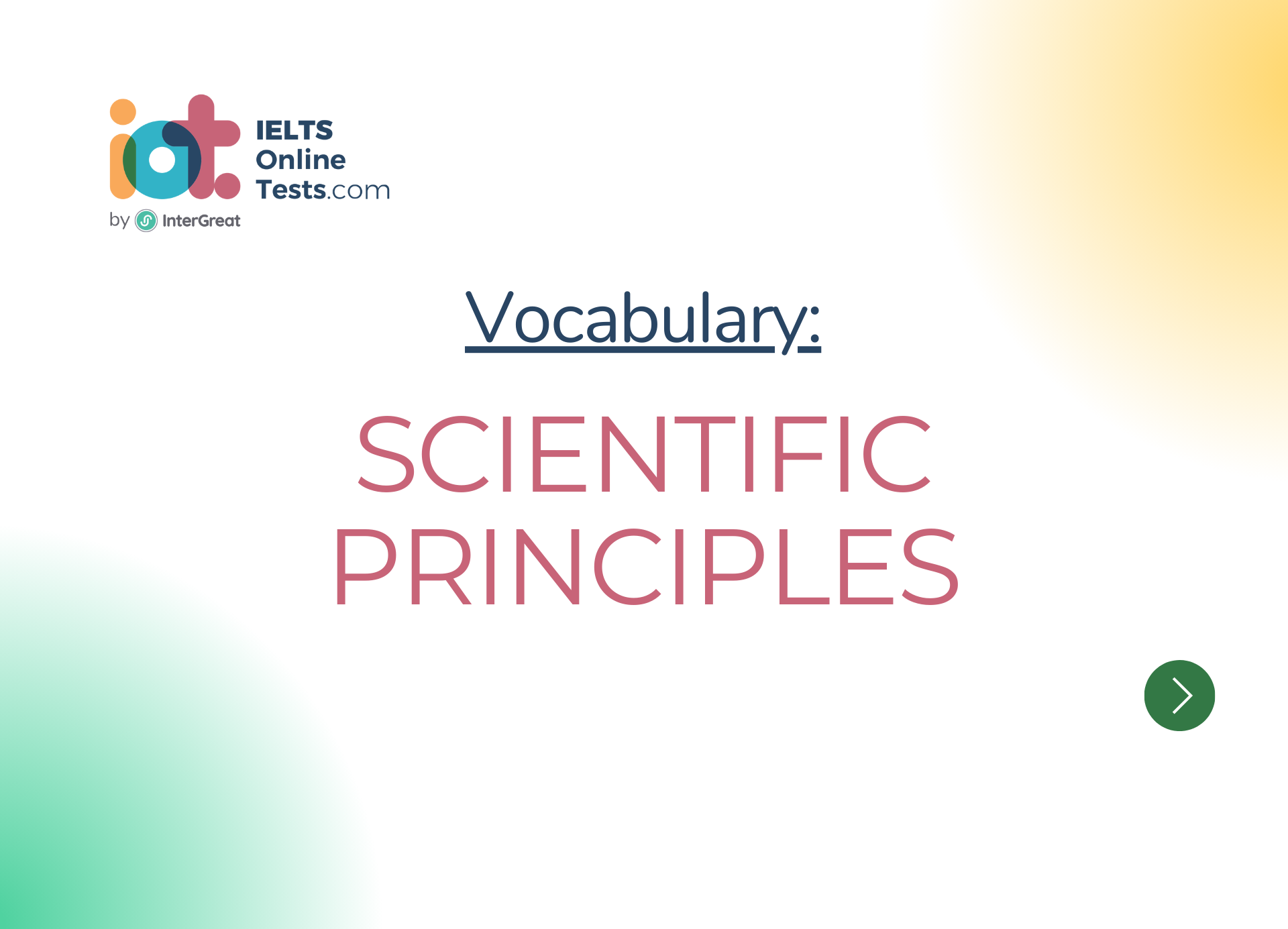
Scientific principles
Below are some vocabulary words related to scientific principles, suitable for the IELTS band score range of 4.5-6.0:
Hypothesis
A testable statement or prediction based on limited evidence, used as a starting point for further investigation.
Experiment
A carefully designed procedure carried out to investigate a scientific question or hypothesis.
Control Group
In an experiment, the group that is not exposed to the independent variable and used as a basis for comparison.
Variables
Factors that can be measured or controlled in an experiment, influencing the outcome.
Data
Information, measurements, or observations collected during an experiment.
Results
The outcomes or findings of an experiment, presented in a quantitative or qualitative manner.
Analysis
The examination of data to identify patterns, trends, or relationships.
Conclusion
A summary of the results and the acceptance or rejection of the hypothesis based on evidence.
Theory
A well-substantiated explanation of natural phenomena, supported by extensive evidence.
Law
A concise statement that describes a fundamental relationship observed in nature, supported by consistent evidence.
Empirical Evidence
Data obtained through direct observation or experimentation.
Replication
The repetition of an experiment to validate or challenge its results.
Sample Size
The number of subjects or data points used in an experiment or study.
Accuracy
The degree of closeness between a measured value and the true value.
Precision
The degree of consistency or reproducibility of measurements.
Inference
A logical conclusion or deduction based on evidence and reasoning.
Causation
The relationship between cause and effect, indicating that one event leads to another.
Correlation
A relationship between two variables that tend to change together, without implying causation.
Bias
Prejudice or favoritism that may affect the objectivity of data collection or analysis.
Peer Review
Evaluation of research or scientific work by experts in the same field to ensure quality and validity.
Reproducibility
The ability of other researchers to obtain similar results when repeating an experiment.
Independent Variable
The variable that is deliberately manipulated in an experiment.
Dependent Variable
The variable that is measured or observed and affected by changes in the independent variable.
Null Hypothesis
A statement suggesting that there is no significant relationship between variables in an experiment.
Statistical Significance
The likelihood that the results of an experiment are not due to chance.
Controlled Variables
The factors in an experiment that are intentionally kept constant to prevent them from influencing the results.
Experimental Error
The inaccuracies or uncertainties that may arise during the conduct of an experiment.
Validity
The extent to which a test, experiment, or study accurately measures what it intends to measure.
Reliability
The consistency and stability of the results obtained from an experiment or measurement.
Bias
A systematic error in data collection or analysis that results in a deviation from the true value.
Sample Bias
A bias that arises when the sample used in a study does not accurately represent the entire population.
Confounding Variable
An extraneous factor that may affect the results of an experiment and confuses the interpretation of the data.
Ethics
The moral principles and guidelines that govern the conduct of research involving human subjects or animals.
Informed Consent
Consent obtained from participants in a study after they have been fully informed about the nature of the research.
Anecdotal Evidence
Evidence based on personal accounts or stories, which may not be reliable for drawing scientific conclusions.
Statistical Analysis
The process of using statistical methods to analyze data and draw meaningful conclusions.
Randomization
The process of assigning participants to different groups in an experiment randomly, reducing bias.
Standard Deviation
A measure of the spread or variability of data points from the mean in a data set.
Normal Distribution
A symmetrical bell-shaped distribution of data points around the mean, commonly found in nature.
Probability
The likelihood of an event or outcome occurring, expressed as a percentage or fraction.
Significance Level
The threshold used to determine whether the results of an experiment are statistically significant.
Research Design
The overall plan or structure of an experiment or study, including its methodology and data collection procedures.
Peer Review Process
The evaluation of research or academic work by experts in the same field before publication.
Systematic Review
A comprehensive review of existing literature and research studies on a particular topic.
Literature Review
A critical examination and summary of the available literature on a specific research question.
Remember to practice using these scientific principles vocabulary words in context to reinforce your understanding and improve your language skills. Familiarity with these terms will enable you to discuss scientific concepts effectively and confidently in academic settings, which can contribute to your success in the IELTS exam. Best of luck with your studies!




